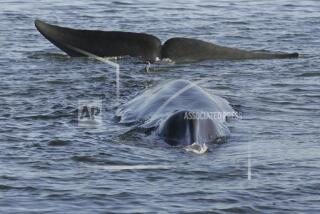Hang up the harpoons, Japan
Few environmental conflicts are as fraught and intractable as whaling.
Under the International Convention for the Regulation of Whaling, commercial whaling has been illegal since 1986. But the agreement contains a loophole that has guaranteed continuing controversy: Signatories can still kill whales for scientific research.
Since the ban took effect, Japan’s whaling industry has continued to kill hundreds of whales a year, insisting that the annual hunt is necessary for research purposes. The meat of whales taken in the name of science can be sold legally, and it is in Japan.
But Australia is now challenging Japan’s claim of scientific whaling in the International Court of Justice, alleging that it is simply a cover for the continuation of commercial whaling. The court is unlikely to rule on the issue for several months, but already Japan is preparing for a potential loss by threatening to leave the International Whaling Commission and, in effect, to become an “outlaw” whaling nation.
The battle over whaling has pitted a handful of countries that remain committed to it — primarily Japan and to a lesser extent Norway and Iceland — against dozens of anti-whaling nations and a tidal wave of global public opinion.
But regardless of what one thinks about the ethics of whaling, its continuation makes no sense from an economic, political, ecological or cultural perspective.
Economically, the industry survives only through heavy government subsidies. Industrial whaling in Japan is largely a post-World War II phenomenon, so claims that it is part of a deep cultural tradition are baseless. Few livelihoods depend on whaling and nobody will go hungry because of a lack of whale meat. In fact, demand for whale meat is at an all-time low, despite efforts to inculcate a taste for it in young Japanese through its inclusion in school lunch programs. According to the Ministry of Agriculture, Forestry and Fisheries, the industry is planning to ship 2,400 tons of whale meat this year, down almost a hundredfold from the 1962 peak of 233,000 tons.
In Japan, the whaling industry employs fewer than 1,000 people, and those jobs are completely dependent on public handouts. According to a recent study by the International Fund for Animal Welfare, Japan annually spends about $30 million subsidizing whaling. Whale watching, on the other hand, annually generates more than $20 million in Japan, as well as being a multibillion-dollar growth industry around the world.
Politically, whaling causes nothing but ill will and tarnishes Japan’s image. The current skirmish with Australia is merely one example of how Japan has had to expend political and economic capital to support a deeply unprofitable and unpopular industry. Furthermore, in an effort to overturn the 1986 moratorium, countless Japanese diplomats have spent the last three decades cajoling poorer nations — most of whom have no interest in whaling — into joining the IWC and voting with Japan.
Ecologically, whaling is unjustifiable. Most whale species are not even close to recovering from the massive population crash caused by commercial whaling. From a conservation perspective, it is very unwise to harvest a large mammal that reproduces very slowly. Fin whales — the second-largest animal ever to live on Earth and a species that Icelandic whalers continue to hunt — gestate for 11 months and give birth to just one offspring every three years.
Moreover, scientific studies demonstrate that whales play an important role in ocean ecology. By feeding on deepwater plankton and excreting at the surface, they help prime the “biological pump” that ensures the continual recycling of nutrients throughout the oceans’ depths.
Ironically, the most compelling reason why Japan and other nations should stop whaling may well be the least likely to persaude them to do so: the cultural shift in people’s attitudes toward whales since WWII. The whaling industry is still struggling to come to grips with the fact that in Western popular culture, the whale has been transformed from mere blubber and baleen to a sort of Buddha of the deep — a gentle, peaceful and highly intelligent behemoth that has lived in harmony with its environment for millions of years.
Such views reached a new level of intensity after Greenpeace began its spectacular protests against Soviet whalers off the coast of California in 1975. Not surprisingly, the idea that such beings could be treated as a mere natural resource was abhorrent to these activists, and the general public, brought along by movies such as “Free Willy,” agreed. Even though many marine biologists find the Buddha-of-the-deep notion problematic, it has nonetheless indelibly shaped public attitudes toward cetaceans. It is hard to imagine how a small group of people who wish to continue killing whales could make any inroads into today’s anti-whaling sensibility.
Regardless of what the International Court of Justice rules, the few remaining whaling nations should cut their losses — and whaling subsidies — and take advantage of the benefits that come from membership in the non-whaling community. Their hearts might not be in it, but they’d stand to gain far more than they would lose.
Frank Zelko is an associate professor of environmental studies at the University of Vermont and the author of “Make It a Green Peace! The Rise of Countercultural Environmentalism.”
More to Read
A cure for the common opinion
Get thought-provoking perspectives with our weekly newsletter.
You may occasionally receive promotional content from the Los Angeles Times.










